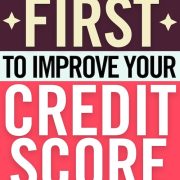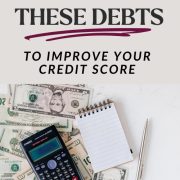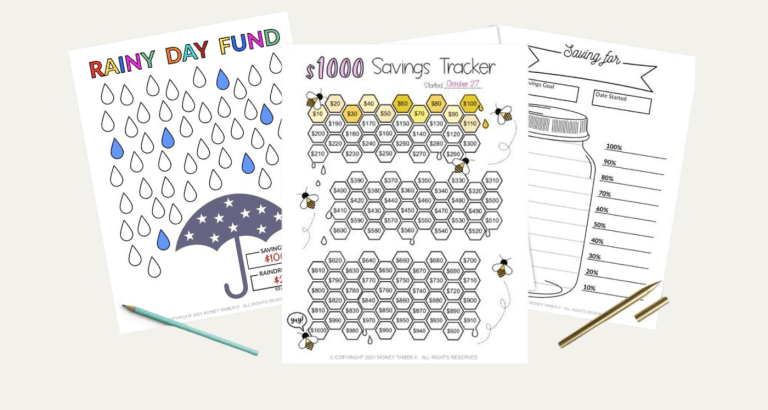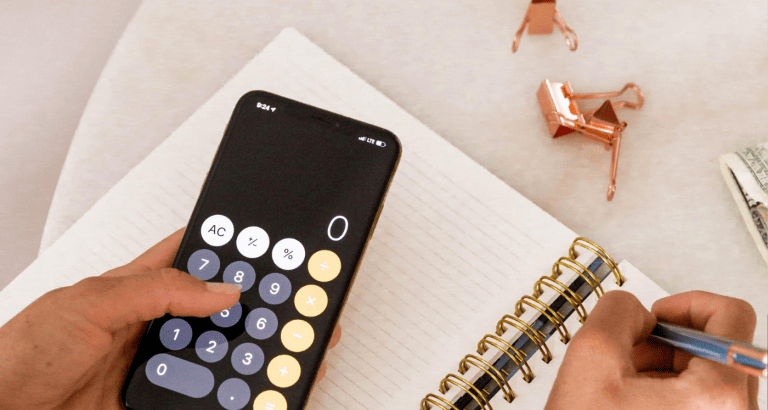Which Debt to Pay Off First to Improve Credit Score
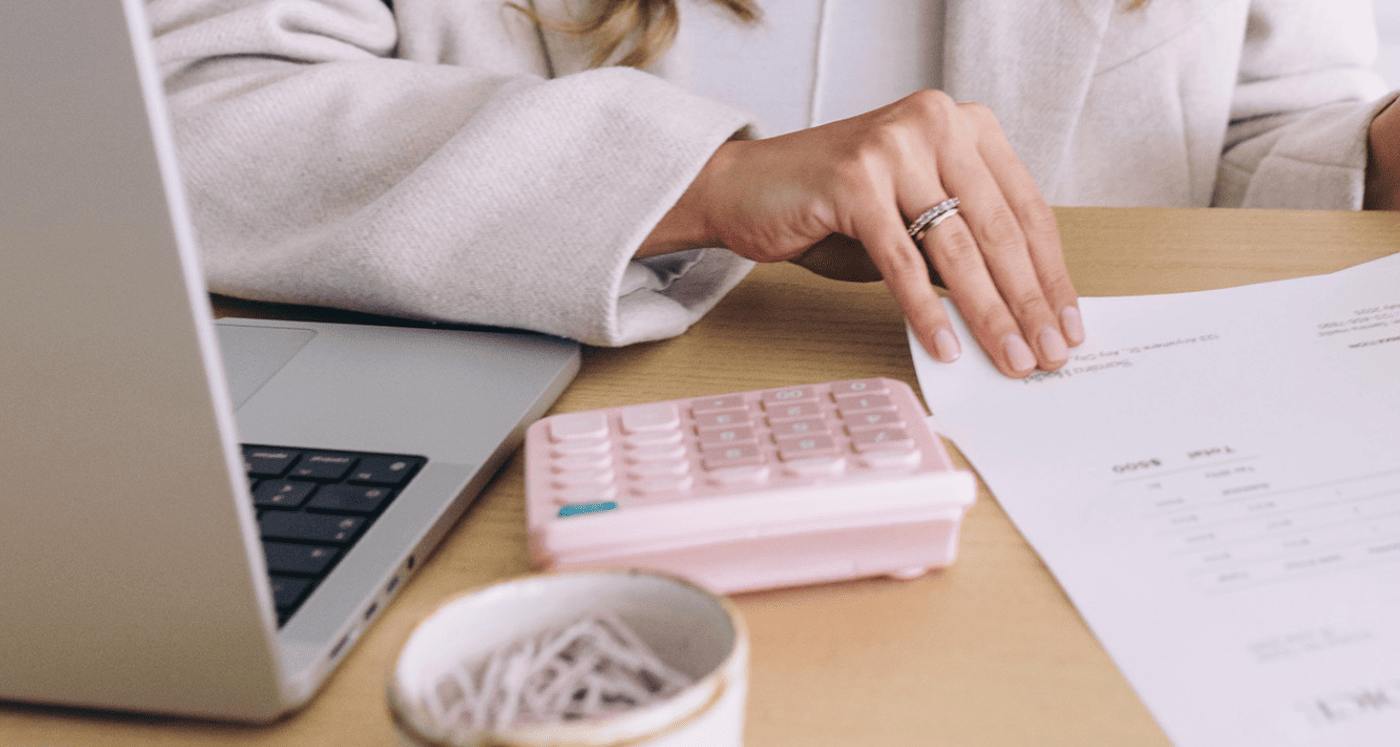
A lot of people have debt from a variety of places. Credit cards, student loans, mortgages, and more.
You want to get out of debt, but you’re trying to be strategic about it. Maybe you have some big purchases coming up that require an excellent credit score, so you want to do two things at once by paying off the debt that will help you the most.
As an affiliate partner of various brands and sponsored content, HerPaperRoute may earn commission on qualifying purchases. Disclaimer
You may find yourself asking questions about which debt to pay off first to improve your credit score.
Is there a rule for this, or does it depend on your finances and credit? Here are some tips to consider when getting ready to attack your debts.
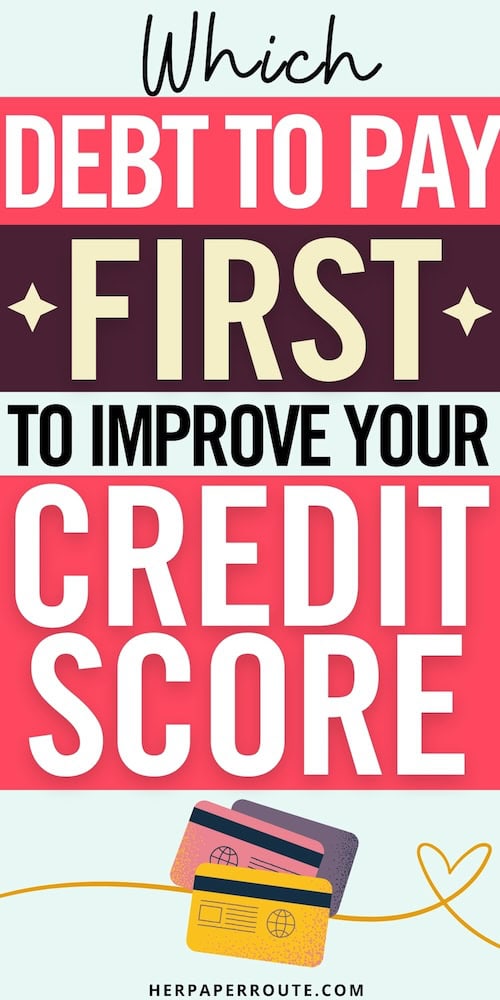
How to Increase a Credit Score
Your credit score can increase from a variety of factors. The first doesn’t even require paying off debt.
It involves contacting your credit card companies and asking for a higher credit limit. This can improve credit ratios and help you get a better score, as long as you don’t spend more on your credit cards.
You’re trying to lower the percentage of credit you’re using, not add to it. But be warned that this may cause a hard pull on your credit report which could temporarily lower your score.
If you want to avoid having a credit check, many credit cards will automatically increase your credit line based on the age of your account, how responsibly you use the credit, and your gross income.
So one option is to just wait until it increases on its own or go into your credit card profile and update your income if it’s increased.
Next, in much the same way that adding to your credit limit improves your score, paying off debts can also help. The idea is to use less of your available credit for a better ratio.
If you want to improve your score, consider paying off some debts.
Last, do not be late with your payments. No matter what, for a good credit score, always take care of your payments on time. Your credit score is impacted quite a bit by your payment history.
Which Debt Should be Paid Off First?
When you’re looking to change your credit score for the better, one option is to focus your efforts on credit card payoff. Credit cards often have the highest interest rates and account for a large percentage of your credit utilization.
For debt, there are installment loans and revolving credit. Installments are things such as a mortgage or student loans, which is a set amount of money that you borrow at one time. Revolving credit is stuff like credit cards that are borrowed on a continual basis up to a specific limit.
Usually, to help your credit score increase, paying off your credit cards first impacts your credit score positively since that’s the credit utilization portion you have the ability to control.
When focusing on your credit card debt, you can go in a few directions. By paying off the card with the most significant utilization ratio, this may help your credit score the fastest.
You may also choose to pay off the card with the lowest balance or highest interest rate. By paying off the lowest balance, you’ll be able to check a payment off of your bills list while going after the debt with the highest interest rate will save the most money in interest payments.

Keep track of your debt pay-off journey with this digital profit planner!
Is it better to pay off one credit card or reduce the balances on two for credit score?
You should always pay your minimum balances on your credit cards to keep yourself in a good financial position. After doing this, you can focus on paying off one card at a time. It’s much easier to accomplish your goals that way.
Consider your credit ratio and if you have a card that contributes to a lot of the credit you use, try getting that one paid off first. Obviously, each situation is different, so your debt payoff may vary from this.
The overall goal is to get your credit utilization ratio lower. It’s calculated for each card and total across all accounts.
Here is an example explaining the differences. Let’s assume that for both examples the total revolving credit is $10,000 and debt is $4,000.
Example 1: Credit Card A has a limit of $6,000 and debt of $3,000. Credit Card B has a limit of $4,000 and debt of $1,000. Credit Card A has a credit utilization of 50% and Credit Card B is 25%. Total credit utilization is 40%.
Example 2: Credit Card A has a limit of $4,000 and debt of $3,000. Credit Card B has a limit of $4,000 and debt of $500. Credit Card C has a limit of $2,000 and debt of $500. Credit Card A has a credit utilization of 75%, Credit Card B is 12.5%, and Credit Card C is 25%. Total credit utilization is 40%.
You can see how the total credit utilization and debt amount is the same in both examples but the utilization for each card varies greatly. Generally, less than 30% credit utilization is considered good.
If you’re trying to raise your credit score, the greatest effect would happen if you put extra payments to the card with the highest credit utilization percentage in order to bring it down.
Now, you may be tempted to think that another way to raise your credit score is to add another credit card and not spend with it. While this would increase the amount of credit you have available, applying for a new credit card will put another credit check on your account and lower the average age of your accounts.
Which credit card should I pay off first to improve my credit?
Is there a “right” way to pay off your credit cards? You already know that it’s a good idea.
It gets rid of debt, high payments, and gives you peace of mind. But maybe you also want to know how to do two things at once – improve your credit and pay off debt.
Highest Utilization Ratio
Generally, when you want to improve your credit score, you should pay off the card with the highest credit utilization ratio.
It’s usually a good plan to get rid of this one first because it lowers the credit utilization percentage for that card significantly. Make sure you don’t use this freed-up credit to go back into debt.
Paying off the credit card with the highest utilization ratio shows that you’re using a lower percentage of all your available credit as well, which looks great for your credit score in many cases.
Lowest Balance
You might also go after the card with the lowest balance. This can help because it will quickly wipe out the debt for one of your credit cards, which can improve your score.
This method of going after the debt with the lowest balance first is called the debt snowball method. It’s actually what I use and recommend when paying off debt.
But if you’re looking for a quick boost of your credit score, this method will help but not maximize your credit score increase. Overall, no matter which card you pay off first, when you determine to get rid of some credit card debt, it’s likely to improve your score because your credit ratio will get better.
How Much Will a Credit Score Increase After Paying Off Credit Cards?
There’s no exact answer for this, and it may be impossible to tell exactly how your situation will be affected. Typically, it’s important to stay below 30% of your credit utilization to keep your credit score high.
But the things that can affect it are numerous, so it would be challenging to say for sure how much your own score will increase.
However, what paying off your credit cards does do, is it gives you a lot of peace of mind and fewer payments. You won’t be stressed about paying off your cards, and you’ll be able to keep more of your money each month.
Just this by itself might make you wealthy if you invest that extra money instead of using credit cards. So no matter what your credit score does, paying off that debt is still very worth it.
Does Paying Off Debt Early Improve Your Credit Score?
Actually, if you pay off a loan earlier than planned, your credit score may drop a little. This doesn’t make this a bad idea; it’s just something to be aware of.
This is mainly referring to installment loans rather than revolving credit. Because once you pay off your car loan or student loans, that debt will be removed from your credit utilization.
It’ll still be on your credit history, but it will not have as significant an impact on your credit score. That doesn’t mean you shouldn’t pay off debts early! Being debt-free is the ultimate goal and is a major key to financial independence.
Once you’re financially free, you’ll care a lot less about your credit score. Plus, it’s not like having an excellent loan payment history is bad. You’ll still likely have great or excellent credit.
In the long run, you’ll fare much better being able to afford the things you want to buy instead of needing lines of credit. Instead, you’ll get to keep all that money you’re paying in interest to the bank which sounds like an amazing deal to me.
Remember that all of this is very subjective because it depends on your own finances and your own credit. Plus, the exact algorithm used to calculate credit scores is a secret so everything is the best guess based on the data outside sources have.
Will Clearing All Debt Improve Credit Score?
All debt, including loans, mortgages, and credit card debt, are essential to pay off. But will getting rid of all of it help your credit score? More importantly, should you even care if your score is affected at that point?
Each person’s credit score is different and so what will happen to it depends on many factors. But sometimes, paying off all debt can affect your credit score negatively.
But just because something might lower your credit score a bit is no reason not to pay off all your debt. When you pay off everything, like your car, home, credit cards, and other loans, this hugely affects your life.
Don’t put off debt repayment just because your credit score might change slightly. No one is saying your credit score will tank either; it may just dip a few points before going back up.
My Credit Score Dropped After Paying Off Debt – Why?
It’s true – paying off debt can have an effect on your credit score, and it may not always be positive. There are several reasons this can happen.
These include credit utilization, the types of credit you have, and the age of your accounts. If the debt you paid off was your oldest account, your score may dip until your other accounts age a bit.
Or if the debt was worth a significant percentage of your credit utilization, you may not have as much credit to use. You should be aware of this in case you need your credit score to get a mortgage soon but may not be something you need to worry about if you don’t plan on taking out additional lines of credit.
If it’s just for credit score bragging rights, brag about being debt-free instead. Unfortunately, your income and how much money you have in savings have no effect on your credit score despite those being better determinants of wealth.
How Many Credit Cards Should I Have?
This question is tricky and doesn’t necessarily have one answer. According to Experian, the average American has 3.84 credit cards.
But it may be better for you personally to do something different, depending on your particular situation.
And having credit cards is not the same as carrying a balance on them and piling up debt. You can have a credit card and not have any debt at all.
Why Debt is Bad for You
Debt is harmful in most cases because it has to be paid back with interest. It makes your bills cost more each month because it has to be paid back, and it can hinder your progress towards where you want to be financially.
Debt is nearly always bad for you and your wallet because it lingers and can hurt your credit score in some cases.
How to Avoid Debt
Debt can take a lot of time to pay back and isn’t worth it in many cases. It gives you a chance to buy items in the moment that you might typically have to wait for, but it can cost a lot more over a more extended period, too.
Here are the types of debt to avoid and how to stay away from them.
Avoiding credit card debt
Credit card debt is something that can likely be avoided and should be. Often, credit cards are used to buy things that are fun but unnecessary.
There may be cases where people use credit cards to pay for living expenses, which sometimes means that they live paycheck to paycheck. If this is what’s happening to you, it might be time to look for ways to make more money instead of relying on credit cards.
In other cases where credit cards are mainly used for fun or convenience, it’s possible to completely avoid them. It requires practice and telling yourself no, but you can do it.
It’s better to save up and pay for something in full instead of carrying the debt for months or years. If you find that credit cards are a problem for you, and your debt tends to increase when you have them, try putting them away, not in your wallet, or getting rid of them altogether.
Avoiding loans
There are loans for everything from college to brand new cars. Loans are different than credit cards but should still be avoided when possible because of the time they take to pay back and the interest.
Next time a large expense needs to be paid for, look for other options instead of running to get a loan. For example, scholarships and grants can help out with college.
Related: How to Go to College Debt-Free
Instead of getting a new car, consider saving up and buying a used one. There are many ways to avoid loans when you set your mind to it.
Tips for Paying Off Debt
There are lots of ways to ditch debt and improve your life (and maybe your credit score!). Here are some standard methods to help you begin.
- Get a second job. This is a fast way to start paying off your debts. Make more money, and put all of it towards paying off credit cards and loans.
- Sell an expensive car. Many times car payments are not worth it. If your car costs you a lot each month, consider selling it and using that money to pay off debt.
- Stop eating out and shopping recreationally, and put that money towards debt. Instead of spending, save some money by sticking to a stricter budget. Use the extra to get rid of debt.
- Don’t take on new debts. Obviously, it’s impossible to get out of debt if you add on more. So no matter how tempting, don’t use credit cards or apply for new loans.
- Sell stuff – from small things like furniture to something as big as your house, you can sell items to pay off debt. It can speed up the process if you can do this.
Knowing Which Debts to Pay Off First Can Help Improve Your Credit Score
It’s smart to know how to begin when you want to pay off debt and improve your credit score. Typically, beginning by paying off the card with the highest utilization ratio or the one with the lowest balance will be best.
Of course, you can start anywhere you want to with credit card payoff, but one of these options may help you increase your score. The most important thing is to start somewhere and don’t give up as you work on improving your score and getting rid of debt.
Keeping a high credit score can help you in a variety of ways, from saving money on insurance to better interest rates.
Be aware of your credit score and make sure that you are putting yourself in the best financial situation possible.
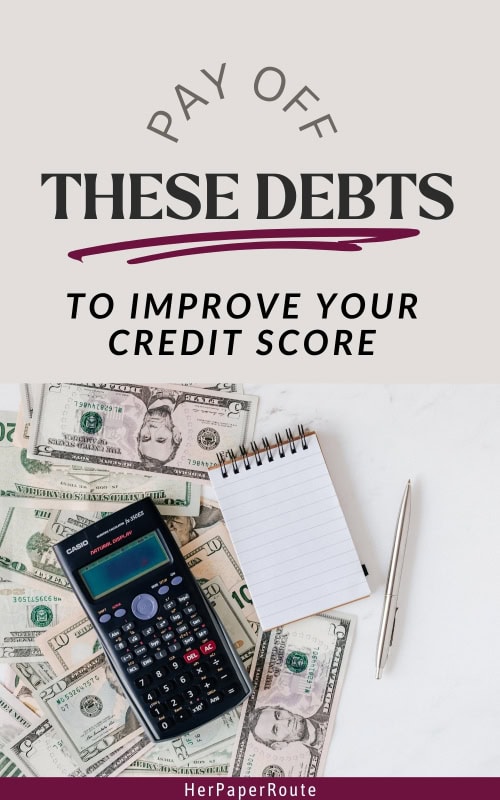
Follow along on Instagram!


